- Superfoods diet focuses on what you should eat instead of what you can't
- Superfoods are readily available in stores; the health benefits are scientifically proved
- You will lose weight without trying, experts say of eating more superfoods
(CNN) -- When you're on a diet, food consumes your life.
You can't eat carbohydrates, so you think about them constantly. You can't dig into your co-worker's candy drawer, so M&M's float across your computer screen like a desert mirage.
You skip the bar after work because that's where the margaritas live. And forget snacking after 8 p.m.; that would be breaking diet rule No. 364.
"I've hated diets all my life," says Lucy Danziger, who is ironically the author of a new weight-loss book, "The Drop 10 Diet."
"If I tell you 'Don't think about this,' that's all you can think about."
What if losing weight didn't have to be so negative?
As the editor-in-chief of SELF magazine for more than 10 years, Danziger has seen every fad diet known to woman come across her desk.
Then, five years ago, the triathlete decided to ditch dieting all together and focus on choosing foods that would "pay her back." She wanted to run, swim and bike faster, and she needed the proper fuel to do that.
Danziger started eating superfoods: foods like nuts, berries and whole grains that are full of fiber, protein and important nutrients. In less than six months, she dropped 25 pounds.
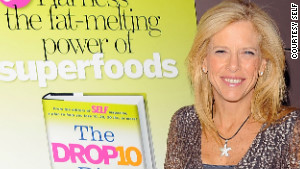
It's certainly not a new nutrition concept: Avoid processed foods; eat more vegetables and fruits; replace white bread with wheat. But the idea of focusing on what you should eat, instead of what you can't, could change the way we look at weight loss in America, Danziger says.
"We're going to give you so many choices of what you can eat, you're not thinking about starvation. ... You're thinking about feeding the engine."
Danziger is big on metaphors. As she noshes on almonds in her office, she compares superfoods to premium gas for a car. "They have to do more than supply you with calories."
So what makes a food "super"?
Dr. Steven Pratt coined the term in 2004 with his first book, "SuperFoods Rx: Fourteen Foods That Will Change Your Life."
According to Pratt, a superfood has three qualifications: It has to be readily available to the public, it has to contain nutrients that are known to enhance longevity, and its health benefits have to be backed by peer-reviewed, scientific studies.
Pratt lists salmon, broccoli, spinach, berries and green tea as a few of his favorites. His website, SuperFoodsRx.com, gives 20 more examples.
"These foods were chosen because they contain high concentrations of crucial nutrients, as well as the fact that many of them are low in calories," the website states. "Foods containing these nutrients have been proven to help prevent and, in some cases, reverse the well-known effects of aging, including cardiovascular disease, Type II Diabetes, hypertension and certain cancers."
Weight loss wasn't on Pratt's agenda when he started supporting superfoods. Yet as he traveled around the world touting the brand, that's what people were excited about.
"The most common thing I hear is how much weight people lost without trying to lose weight," Pratt says. "It's the non-diet diet. It's food you can eat for a lifetime."
Marisa Moore, a registered dietitian with the Academy of Nutrition and Dietetics, says superfoods are healthy, but adding them to your plate won't simply melt the pounds away.
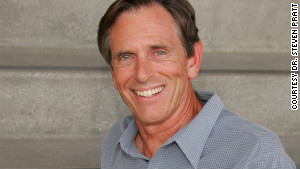
"Yes, there are foods that are high in fiber, water and protein, and therefore promote satiety. ... These are without a doubt recommended as weight-management friendly," Moore wrote in an e-mail. "But to say that they boost fat loss may be taking it a step too far."
Danziger agrees: Superfoods aren't a free pass to eat as much as you want, whenever you want. Still, it would be pretty difficult to get fat eating spinach.
For Danziger, eating superfoods is about energy. She feels super after eating superfoods. She wants to work out, which in turn helps her sleep better, which gives her more energy and keeps her diet on track.
Pratt says that feeling is what keeps the superfoods trend strong.
"The better you feel, the more you do it. Your body will send an e-mail to your brain within minutes thanking it, saying, 'I'm going to do better. I'm not going to get sick anymore.' "
After joking about injecting that feeling into his patients, Pratt turns serious. He's been pushing superfoods since the mid-1990s, and still obesity rates and obesity-related disease rates are sky-high in America.
Pratt attributes most of that to the culture: It takes time and energy to make a change. Danziger says cost is certainly an issue for some people. But both experts agree the reward is worth it in the long run.
"At the end of the day, you invest in your wardrobe and your hair and your car and everything else," Danziger says. "So invest in your body. Because it's supposed to last for 100 years."
Leslie Wade contributed to this story.
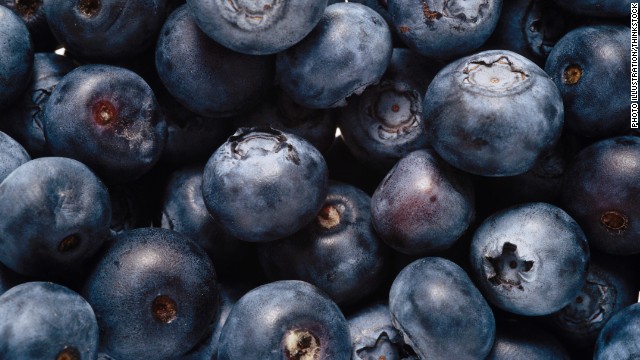 Blueberries are often singled out as a superfood because studies have shown they aid in everything from fighting cancer to lowering cholesterol. But all berries, including raspberries, strawberries and blackberries, contain antioxidants and
Blueberries are often singled out as a superfood because studies have shown they aid in everything from fighting cancer to lowering cholesterol. But all berries, including raspberries, strawberries and blackberries, contain antioxidants and 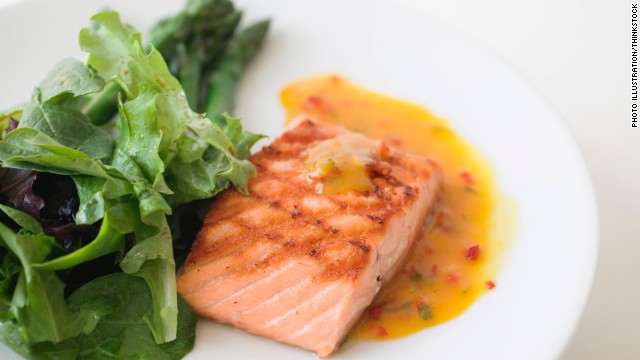 Salmon provides a high dose of omega-3 fatty acids, which studies show significantly lower the risk of heart disease. Omega-3 fatty acids fight back by reducing inflammation and slowing the rate of plaque build-up in blood vessels. Salmon is also a good source of lean protein.
Salmon provides a high dose of omega-3 fatty acids, which studies show significantly lower the risk of heart disease. Omega-3 fatty acids fight back by reducing inflammation and slowing the rate of plaque build-up in blood vessels. Salmon is also a good source of lean protein. 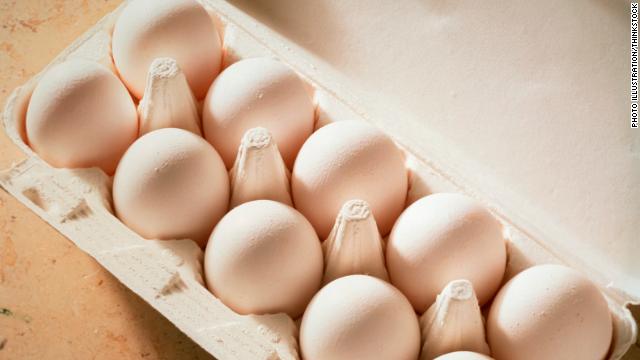 Eating a breakfast high in protein is a good way to keep hunger at bay throughout the day. Eggs are full of choline, a nutrient that helps block fat from being absorbed in the liver.
Eating a breakfast high in protein is a good way to keep hunger at bay throughout the day. Eggs are full of choline, a nutrient that helps block fat from being absorbed in the liver. 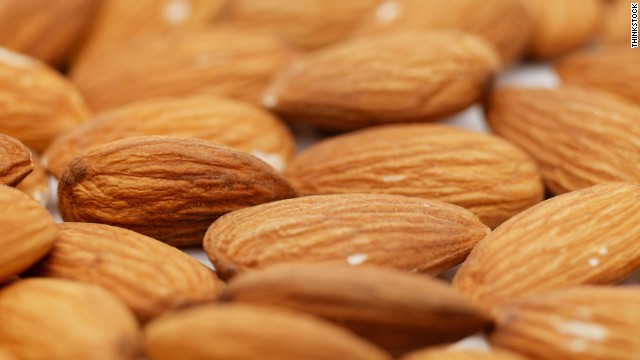 Many dieters shy away from nuts because of their high calorie and fat count. But studies show that eating a handful several times a week can help shed pounds and prevent heart disease. Almonds in particular contain lots of monounsaturated fats and fiber. Self magazine recommends replacing peanut butter with almond butter for a healthy swap!
Many dieters shy away from nuts because of their high calorie and fat count. But studies show that eating a handful several times a week can help shed pounds and prevent heart disease. Almonds in particular contain lots of monounsaturated fats and fiber. Self magazine recommends replacing peanut butter with almond butter for a healthy swap! 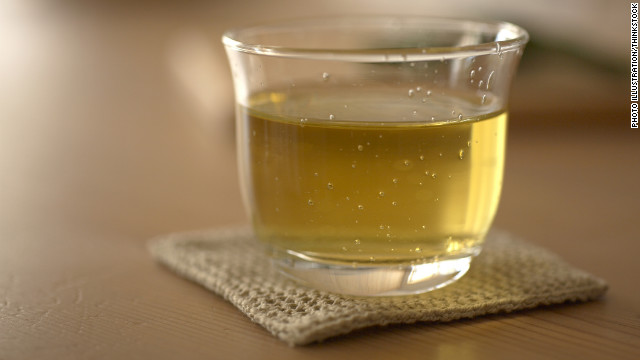 Staying hydrated will keep you from munching absentmindedly, and if you choose to drink
Staying hydrated will keep you from munching absentmindedly, and if you choose to drink 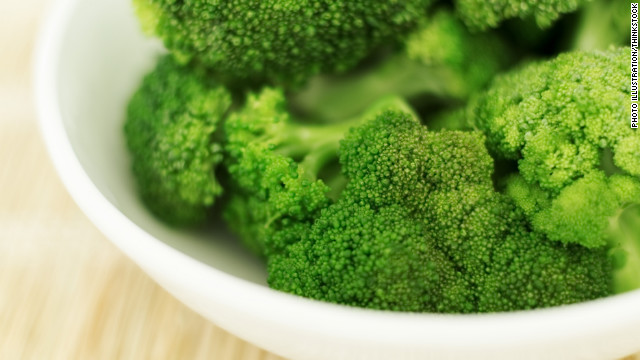 Broccoli is one of nature's most nutrient-dense foods, with only 30 calories per cup. That means you get a ton of hunger-curbing fiber and polyphenols -- antioxidants that detoxify cell-damaging chemicals in your body -- with each serving. Researchers from
Broccoli is one of nature's most nutrient-dense foods, with only 30 calories per cup. That means you get a ton of hunger-curbing fiber and polyphenols -- antioxidants that detoxify cell-damaging chemicals in your body -- with each serving. Researchers from 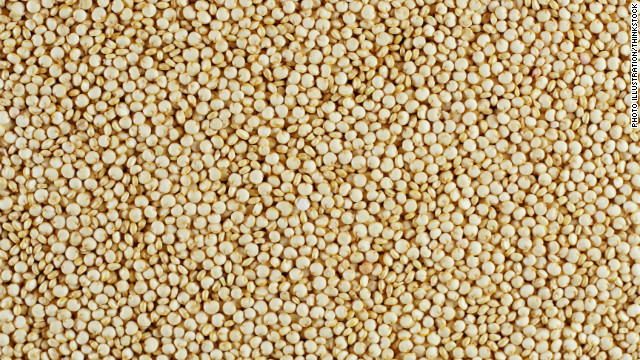 Quinoa is the popular whole-grain du jour because it also contains a good dose of protein to help build muscle. Yet including any type of whole grain in your diet -- from barley to brown rice -- will aid in weight loss by filling you up for fewer calories.
Quinoa is the popular whole-grain du jour because it also contains a good dose of protein to help build muscle. Yet including any type of whole grain in your diet -- from barley to brown rice -- will aid in weight loss by filling you up for fewer calories. 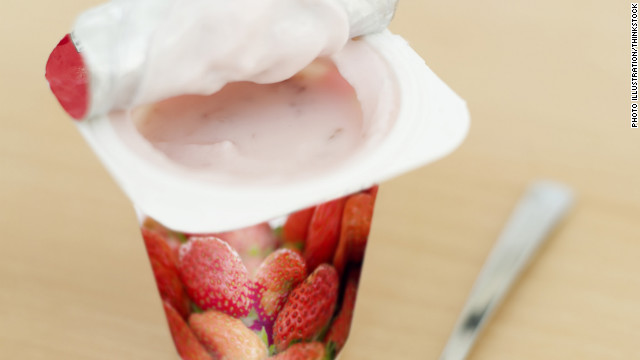 Low-fat dairy is an important part of any superfood-focused diet.
Low-fat dairy is an important part of any superfood-focused diet. 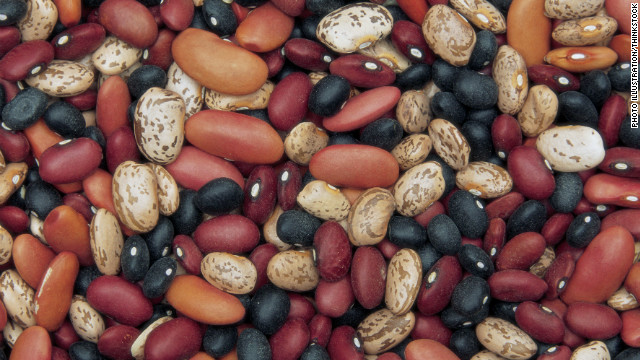 Beans, beans, the magical fruit; the more you eat, the more ... you lose weight. Black, kidney, white and garbanzo beans (also known as chickpeas) all end up on superfood lists because of their fiber and protein. They fill you up and provide muscle-building material without any of the fat that meat can add to your meal.
Beans, beans, the magical fruit; the more you eat, the more ... you lose weight. Black, kidney, white and garbanzo beans (also known as chickpeas) all end up on superfood lists because of their fiber and protein. They fill you up and provide muscle-building material without any of the fat that meat can add to your meal. 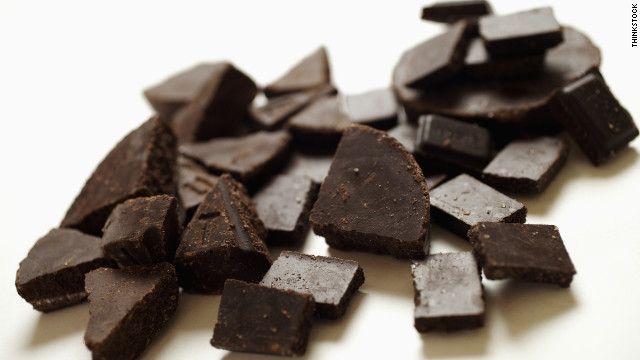 While researchers aren't quite sure that
While researchers aren't quite sure that
No comments:
Post a Comment